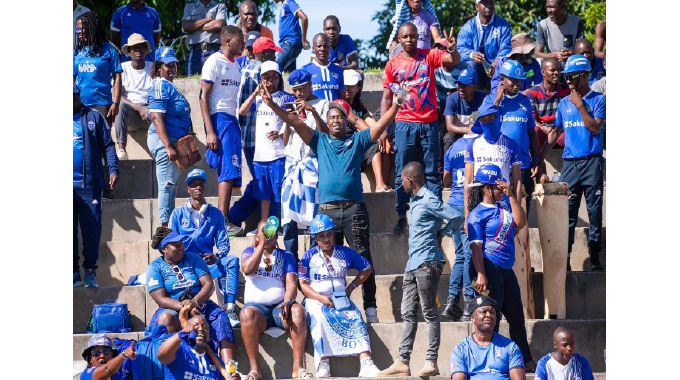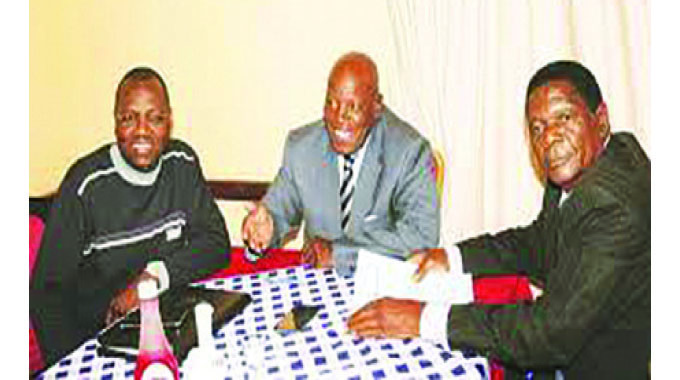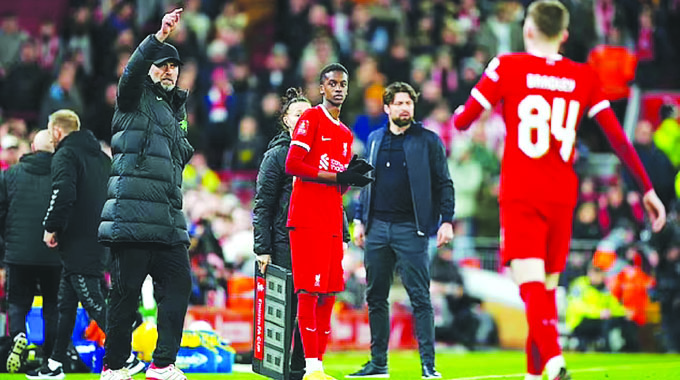LIKE MUHAMMAD ALI, OUR WARRIORS FLOATED LIKE BUTTERFLIES AND STUNG LIKE BEES

 FOR us, this should have been a week of grand colourful celebrations, with our football staging its version of the street carnival that illuminates Harare every summer, when wild parties were supposed to make up for all that emotional torture we collectively endured last week. Oh, yes, even against the depressing background of the untimely death of Steve Keshi, as legendary an African footballer and coach as they will ever come, we still should have found time, and a stage, to throw a massive party for our national game, for ourselves.
FOR us, this should have been a week of grand colourful celebrations, with our football staging its version of the street carnival that illuminates Harare every summer, when wild parties were supposed to make up for all that emotional torture we collectively endured last week. Oh, yes, even against the depressing background of the untimely death of Steve Keshi, as legendary an African footballer and coach as they will ever come, we still should have found time, and a stage, to throw a massive party for our national game, for ourselves.
After all, Daniel Amokachi, the man who was Keshi’s right-hand man during their time in the trenches handling the impossible job of coaching the Super Eagles, told my colleagues on SuperSport’s Soccer Africa on Thursday night, there was no need to mourn Keshi.
He said we should, instead, celebrate his life and, crucially, his immense contribution to this game we love.
We called him The Boss, a towering figure in football, a larger-than-life fellow whose enduring appeal, infectious smile and striking handsome features, smashed national boundaries and made him more of an African icon, than a Nigerian one.
Keshi wasn’t perfect, of course, but show me a human being who is dripping with perfection and, like Muhammad Ali, I will show you someone who “handcuffed lightning, threw thunder in jail, who only last week murdered a rock, injured a stone, hospitalised a brick and is so mean he makes medicine sick.”
Journalists covering the Togolese national team at the 2006 Nations Cup finals recall a fight between Keshi and Emmanuel Adebayor on the West African’s team bus one evening in the Egyptian capital Cairo, a fallout which some say had its roots in The Boss not getting his fair share in the transfer of the striker from French club Monaco to English giants Arsenal.
“He was a talker, a brawler and a politician,” Jonathan Wilson, a British football writer who penned a moving tribute for Keshi in The Guardian newspaper, noted in his story this week.
“His critics, of whom there were many, would point out that he liked money, and that he used football to acquire it, although he is hardly unique in that. But he is also the most successful black African coach of all-time, one of two people to win the Cup of Nations as a player and manager, and the only black African to coach in the knock-out phase of a World Cup.
“He could be awkward and obstreperous, and some of his involvement in transfer dealings was murky, but Keshi was, at international level, the finest African coach of his generation.”
Of course, he was, because when you guide a little country like Togo to their first, and only appearance, at the World Cup finals, as Steve Keshi did, you are very, very special.
I met him twice, on the plane as we flew from Cairo to Addis Ababa 10 years ago, and just three years ago when, on a cold night in Johannesburg, he celebrated one of his finest moments, guiding his country Nigeria to Nations Cup success after that victory over Burkina Faso in the final.
On both occasions, he struck me as a man who belonged to all of us, whose identity was more continental than national.
A man who blazed a trail and ended the stereotype that black African football coaches were not good enough, an inferior crop not blessed with the technical and tactical knowledge to succeed in the tough task of guiding national teams to success stories.
A legendary gaffer who set a benchmark of success for black African football coaches like Sunday Chidzambwa and Callisto Pasuwa, our current Warriors coach whose latest chapter, in a book of phenomenal achievements, this week made us smile as a nation.
REMEMBER BAFANA BAFANA, FIVE YEARS AGO, AT THE MBOMBELA STADIUM?
But our hour of triumph on Sunday was, strangely, muted as if we owed the Malawians an apology for thrashing them 3-0, as if we owed Guinea an apology that we had eliminated them, as if we couldn’t believe it that we had finally banished the ghost of under-achievement, which at times bordered on national embarrassment, which had stalked us for exactly 10 years.
Not even a lap of honour by our superheroes, the Golden Generation that had plucked us out of the darkness and dragged us back into the light who sadly, hadn’t been advised that WE HAD DONE IT, not even a cheap bottle of champagne being popped to celebrate our return to the big stage.
Not even an announcement by the person who was in charge of the public address system that, at long last, after a decade in the wilderness, WE HAD DONE IT.
For 10 years we had dreamt of such an occasion and now that it had happened in the place we call home, now that we had secured our qualification with a game to spare, when our new generation of superstars — Khama Billiat and Knowledge Musona — had played a part with a goal each, delivered what we had demanded from them, we appeared too overwhelmed to party.
Our major rivals across the Limpopo have won the Nations Cup before, exactly 20 years ago, while our big rivals across the Zambezi have also been crowned champions of Africa, four years ago, after that hugely emotional success in a Gabonese city that, until then, represented the darkest period of their game because of that plane crash that destroyed a generation of their finest footballers in 1993.
Even after having tasted the joy of being crowned champions of Africa, and having played at the World Cup three times in 1998, 2002 and 2010, Bafana Bafana still found the significance of celebrating ‘qualification’ for the 2012 Nations Cup finals on that October day at the Mbombela Stadium in Nelspruit five years ago.
A year earlier, South Africa had made history by becoming the first African country to host the World Cup finals, Siphiwe Tshabalala had scored that memorable goal at Soccer City before 90 000 fans and they had taken on Luis Suarez — before he became this superstar — in that battle against Uruguay.
But, a year later, with the World Cup bandwagon having long left, the Bafana Bafana players, and their coaching staff, still saw the value of plunging into animated celebrations at the Mbombela Stadium, including a lap of honour, believing they had made it to the 2012 AFCON finals after a goalless draw against Sierra Leone.
Now, this is a country that won this tournament in 1996, came second in 1998, came third in 2000, which played at the World Cup in 1998, 2002 and 2010, made the AFCON quarter-finals in 2002, graced the 2004, 2006 and 2008 editions, made the quarter-finals in 2013 and were there in 2015.
But, still, they found value in staging those wild celebrations in Nelspruit in October 2011, believing they had made it to the 2012 Nations Cup finals.
Of course, as we now know, they hadn’t made it, somehow they had read the rules wrongly and Niger had qualified, because of better head-to-head record, but all that is beside the point because, even in that embarrassment, the Bafana Bafana players, management and their fans showed the value of qualifying for the Nations Cup finals.
Now, what about us, a people who have last been to the Nations Cup finals 10 years ago, who — until on Sunday — had only qualified for the tournament twice in more than 35 years?
How do we treat our latest qualification as if it’s no big deal, as if nothing happened in this campaign, as if our seven-goal demolition of Malawi and Swaziland in our last two games at the place we call home, without conceding a goal, isn’t something special?
Even when everywhere we look around us in Southern Africa we see ruins, boulevards of shattered dreams, giants that were tamed with South Africa and Zambia surveying the unpleasant sights of the wreckage of their failed campaign, we still seemingly don’t appreciate the special feeling that comes with being the LAST MEN STANDING.
MAYBE, IT’S THE NEGATIVE STORIES THAT APPEAL TO US
You can’t blame the fans at the National Sports Stadium on Sunday, after all a big crowd converged there, even though the cheapest ticket cost $5 and the poor, if not pathetic, Internet connection at the giant ground on Sunday made it virtually impossible for the majority of them to get confirmation, on their mobile phones, of the result from Swaziland where Sihlangu’s victory confirmed the Warriors’ place in Gabon next year.
But you can blame our football leaders, the organisers of that game, for not investing in a system that would keep the fans at the giant stadium informed of the events in Swaziland, especially the result — when it came through — and the significance of broadcasting that to those inside the ground.
And you can blame them, too, for not ensuring that — even after their failure on Sunday — they didn’t make up for that by staging a victory parade this week, where the players would celebrate with their long-suffering fans on the streets of our major cities because this was a landmark triumph.
You can also blame those who have been painfully trying all week to set an agenda, in our media, where the focus quickly shifts from the success on the field, on Sunday, to the boardroom where they attempted to tell us that the issue of ZIFA and NAFAZ, whatever it is called, was more important than our achievements on the pitch which culminated with that ticket to Gabon.
And they have been trying all week to replace Khama’s fresh-faced face, and everything good that it represents in the future of our football, with grumpy faces of characters from a forgotten past who have seemingly perfected the art of fighting any leadership, in the our national game, which doesn’t feature their faces, launching another boardroom battle.
Somehow they haven’t seen how we have been shamed by those who are not Zimbabweans, like celebrated South African sports journalist and television presenter, Robert Marawa, who this week sent Twitter exploding with his tweet, “TODAY I AM ZIMBABWEAN!!! CONGRATULATIONS MY NEIGHBOURS!!! THIS IS HUGE!! BEAUTIFUL FOOTBALL DISPLAYED.”
Go to Marawa’s Twitter account and follow the Warriors’ success debate and you will feel proud to be Zimbabwean, what we should have been doing from Sunday right into the weeks to follow.
But check what has been our coverage of the Warriors’ success here and you will be disappointed to see that the sights and sounds of Sunday have already disappeared, the Musonas of our beautiful world quickly replaced by faces of grumpy old men, fighting boardroom battles that will never end.
NAFAZ this, NAFAZ that, ZIFA this, ZIFA that, controversy this, controversy that and all the related nonsense, come on guys, that could wait for another day, another week, it’s not like that it’s a story that is about to go away, like it’s a perishable commodity.
This week was about the Warriors and their long-suffering fans because, with the passage of time, the enormity of what they did — culminating in that phenomenal success story being completed on Sunday — will begin to fade away.
So, why not give them their moment in the sunshine, at least for just a week, just seven days, just about 170 hours, is that surely asking for too much?
Clearly, you can understand when some say we have people, amongst us, who wished we hadn’t won on Sunday because, in their little world, that success was an insult to their beliefs that Philip Chiyangwa was just a clown who would not take us anywhere, let alone becoming the first leader of domestic football to end our decade-long wait for a place at the Nations Cup finals.
Six months after that election, which brought Chiyangwa into power, they are still in the trenches, looking for an opening to throw a punch, waiting for a mistake that hasn’t come and, for them, the success of the Warriors shouldn’t be celebrated because doing so would be an acceptance that they were wrong to quickly dismiss this man as a poor lightweight administrator who would drag our football into the abyss.
Our success on Sunday wasn’t about Chiyangwa, it was about this country, about those men in our golden and green shirts who refused to be defeated in five matches in their 2017 AFCON qualifiers, about Musona and Billiat, about Costa and Chitate, about Malajila and Katsande, about Rusike and Rusike, not the band that used to sing in that ‘Ngwerewere Sadza’ television advert back in the day, but our new crop of forwards.
It’s about Callisto Pasuwa and his backroom staff and, of course, you got it right, about Wicknell Chivayo and his game-changing financial, morale support and drama, including that lucky fan at the National Sports Stadium on Sunday who was waving a placard that read “Sir Chivayo, Kandai $1 000 pa 073288016,” and saw his prayers coming true.
It was about of football, its moment in the bright sunshine in this gloomy winter, and no matter how much they might try to downplay it, to give substance to their dirty politics, they can’t take it away from our national game and the fact that we are the LAST MEN STANDING in Southern Africa makes it very special.
Go on top of Mount Nyanga King Kali, together with your troops, and shout, like Muhammad Ali before you, that “WE ARE THE GREATEST”, kuti zvityise, because you are a very special group and it’s a pity that some people robbed you of a chance to fight for a place at the 2018 World Cup finals.
TO GOD BE THE GLORY!
Come on Warriors!!!!!!!!!!!!!!!!!!!!!!!!!
Khamaldinhooooooooooooooooo!
Text Feedback – 0772545199
WhatsApp Messenger – 0772545199
Email – [email protected]
Skype – sharuko58
Chat with me on Facebook, follow me on Twitter @Chakariboy, interact with me on Viber or read my material in The Southern Times. The authoritative ZBC weekly television football magazine programme, Game Plan, is being refreshed and we off air for now








Comments